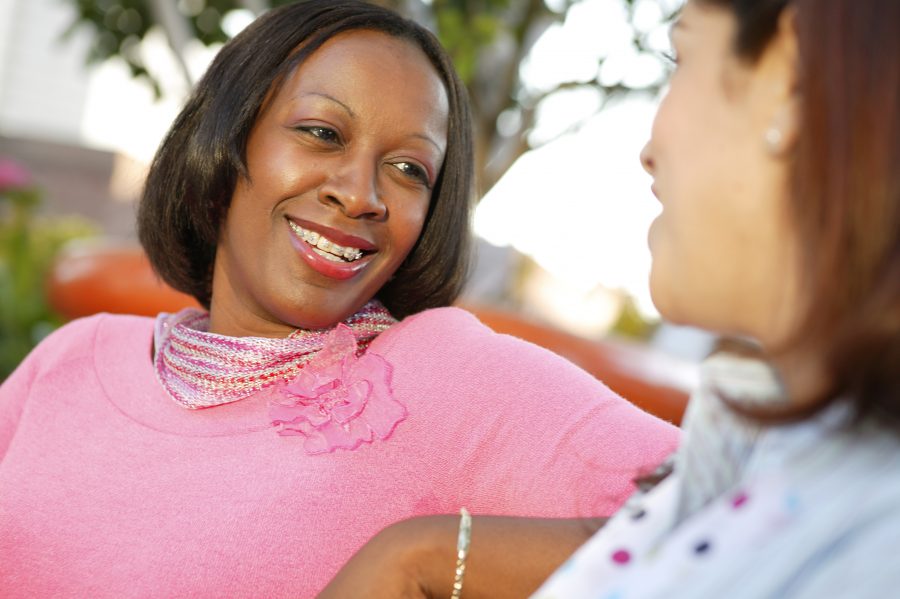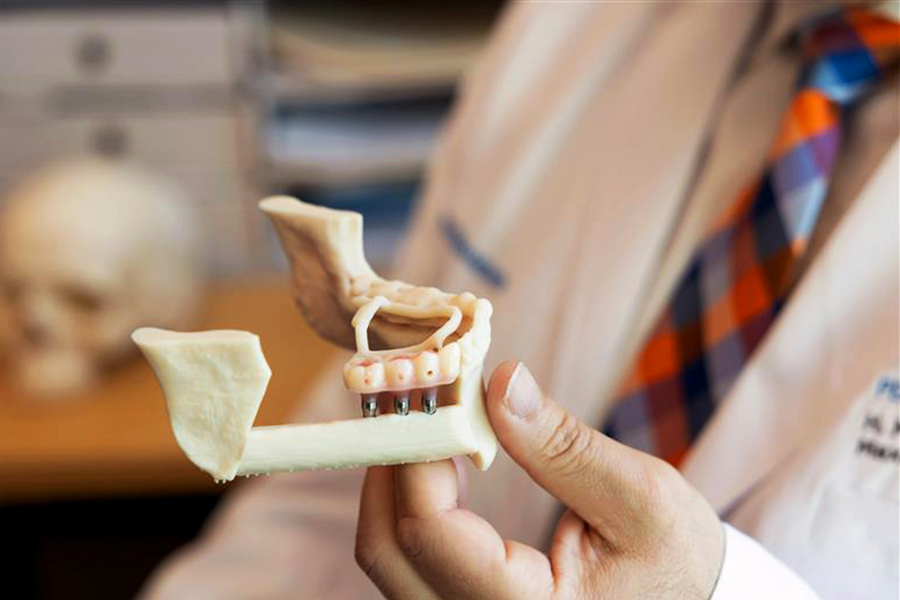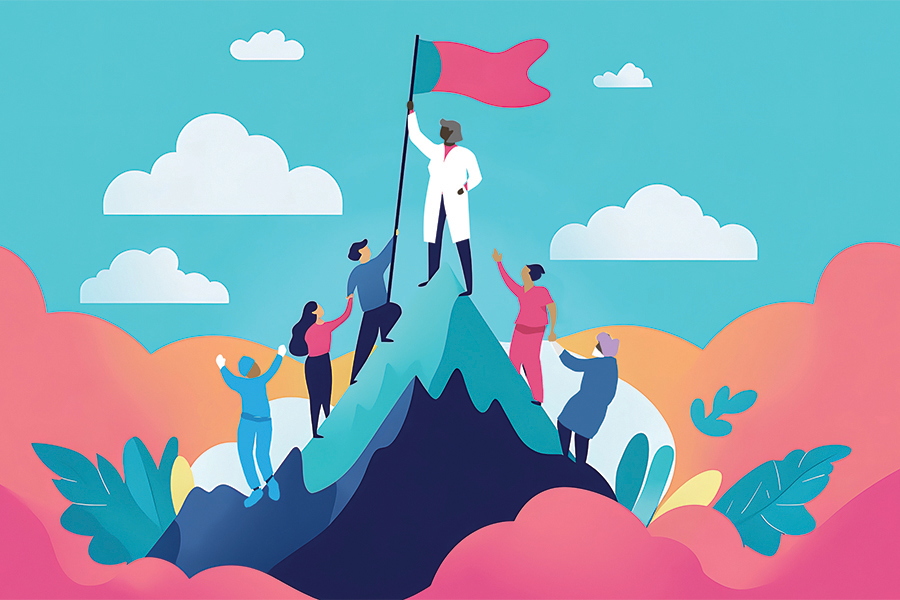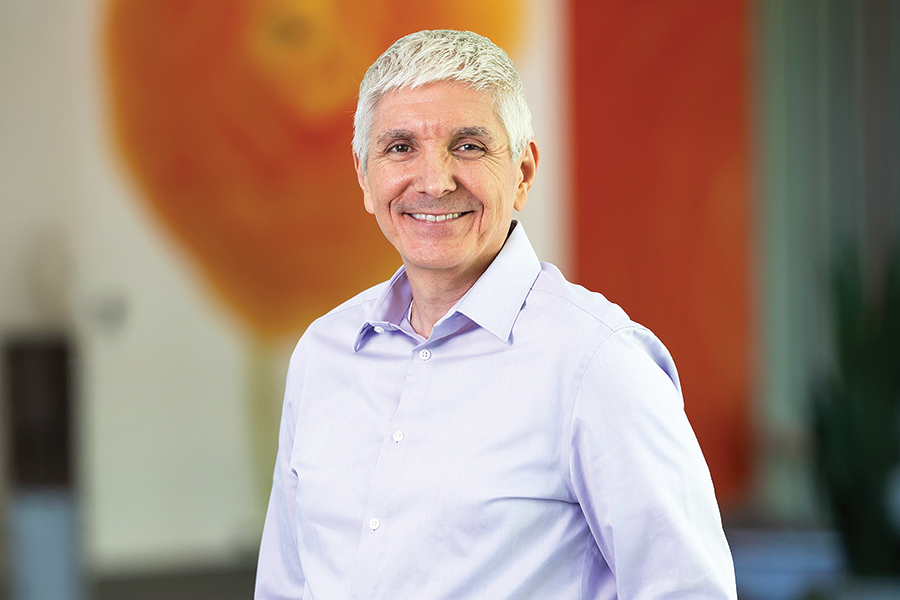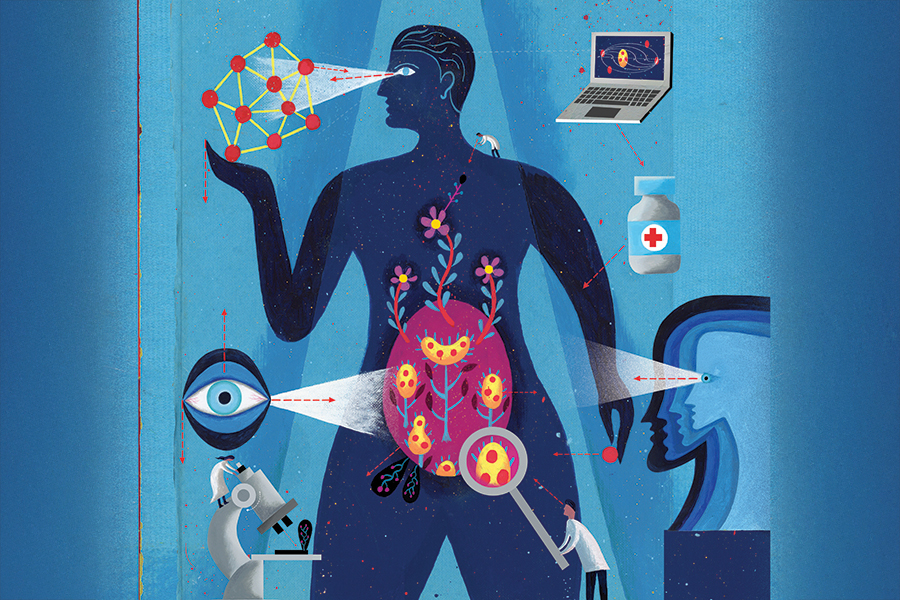Inside KP National-October 30, 2017
One in eight women will be diagnosed with breast cancer, and for each of them the journey is unique. KP employee Gretchen Schreiber shares hers.
Gretchen Schreiber had always been a Type-A personality and, like many working mothers, tended to focus on her own well-being only after taking care of her family and her job.
In the spring of 2016, Gretchen, director of Millennial Strategy, set the goal of learning to meditate and started an eight-week mindfulness program offered by Kaiser Permanente.
The last session of the class was a day-long silent retreat on a Saturday. “We were doing a body scan during our meditations and I knew that something was not right with my body,” she remembers. “When you slow down enough, you pay attention to what your body’s telling you.”
Gretchen Schreiber with Clyde, her one-eyed dog.
Gretchen went to the restroom at lunch to do a self-exam. “As soon as I felt the lump, my head started swirling and my heart started racing,” she said. “That was my first lesson: The process starts well before you hear the diagnosis. In many ways, the beginning is the scariest because it is the most unguided. There are so many unknowns and it’s easy to go to some dark places.”
Every cancer is different
After an anxious weekend, Gretchen arrived at the Breast Care Center in Oakland, California, when the doors opened on Monday morning. By 3:30 p.m., she met with Elizabeth Cureton, MD. A breast exam and ultrasound confirmed that the lumps — Dr. Cureton discovered a second one — were small, but should be checked out. A diagnostic mammogram two days later confirmed that the lumps were a concern and Gretchen had a biopsy that same day.
“I took advantage of every convenience,” she said. “And I am continually amazed at how an integrated delivery system can work with such efficiency and speed.”
Still, the early stages weren’t easy. A third lump was discovered during the initial biopsy, and she ended up getting three needle biopsies in the span of two hours.
Gretchen was at the movies with her daughter when the nurse called — much sooner than she expected. “I was sure she was calling to see how I was doing after the biopsies,” Gretchen said. “But before I knew it, she was asking if I had a place to sit down.”
The nurse confirmed that the samples showed cancerous cells, but Gretchen would have to wait for more detailed lab results to find out what type of cancer and what it meant for treatment. “What many people don’t realize — and I didn’t at the time — is that there are many kinds of breast cancer,” said Gretchen. “Each diagnosis is unique, and each person is unique.”
‘Sprinting up the learning curve’
A long Memorial Day weekend loomed, but then Gretchen’s phone rang again. It was Veronica Shim, MD, head of the Breast Clinic and an oncology surgeon.
“It was the most amazing thing,” said Gretchen. “Dr. Shim had no idea who I was, I hadn’t seen her yet, but she took the time out of her evening to call me so I wouldn’t worry over the long weekend.”
Dr. Shim assured Gretchen that, because the tumors were so small, there was a very good chance that the cancer had not spread to her lymph nodes.
The next 90 days were a blur. “After your diagnosis, you are basically sprinting up the learning curve. You have to learn about the disease, your options, your path. You have to handle all the logistics — family, work, leave, carpool — and then try to take care of your mental health. It’s overwhelming.”
Gretchen’s extended family wrote words of encouragement on pink shirts to show their support.
And “real life” goes on. A week after Gretchen was diagnosed, the family cat scratched her new foster puppy’s eye. “He had surgery a week before me. What a pair we were. He recuperated next to me in bed. At least I didn’t have to wear a cone.”
The same, but different
One of the biggest issues Gretchen grappled with was how to reconcile who she was before and after she learned she had cancer. She was anxious about letting people down, or that they would just move on.
“You’re the same person before and after you find out about cancer, but you’re different too. You can’t not be different. You worry about what people think, you worry about what you think. And you’re not sure what you think.”
It didn’t take long for Gretchen to know what other people thought. She says this is perhaps the most important thing she learned.
The true meaning of team
Gretchen grew up abroad and moved every couple years. She lived in seven countries before coming to California for college, making it hard to create many community-building habits. “It has always been hard for me to accept help,” she said. “But sometimes you have no choice, thank goodness.”
After her diagnosis, any doubts she had about her communities, personal and professional, were put to rest. Gretchen had only been working in her new position with the Millennial Strategy team for four months when she got her diagnosis, and she worried that her newly formed team would feel abandoned. But the support poured in.
David Hall, with HR Leadership Development, made a quilt for Gretchen and has now started a Stretch@KP project to make quilts for other KP patients.
“I couldn’t have asked for a more caring and supportive response,” she said. “They kept saying ‘We’ve got your back’ and they went to extraordinary lengths to make sure of it!”
Her manager stepped in to keep the team strong and moving forward, while also having full confidence in Gretchen’s ability to step back in when the time was right. Meanwhile, her previous co-workers swooped in as well.
“I can’t express how powerful that support was for me. The compassion and care seriously humbled me,” Gretchen said. “And it allowed me to focus on my health. … In learning how to accept help, I grew closer to people and was able to practice putting myself first. This was an amazing outcome of my experience.”
Easing the journey for others
More than a year and three surgeries later, Gretchen still struggles with the complicated feelings of her experience. “I feel so lucky in so many ways, but I know it isn’t like that for everyone. I am in the world as a breast cancer survivor now, but what that means varies from day to day.”
For her, that role comes with a sense of responsibility.
“It means trying to find ways to give back to KP and the women who are at the beginning of their breast cancer journey,” Gretchen said. And a critical part of her ongoing journey has been listening and sharing her story when others in her community receive a cancer diagnosis.
She recently attended a Partners in Pink training to learn how to be a peer navigator for other women diagnosed with breast cancer. She’s excited to help with the parts of the journey that she had to figure out alone — including finding nutrition, mental health, and alternative medicine resources. Acupuncture, for example, was profound in helping Gretchen with nerve pain.
The experience has brought Gretchen back to the lessons of her mindfulness class.
“Every day I check in with myself to make sure that I am living the life I love,” she said. “I spend time with my family. I hike with my one-eyed dog, Clyde. And I start many of my meetings with a one-moment meditation. People may think I’m crazy for that, but it helps me remember to be grateful for my community, to trust in their support, and to be present.
This article originally appeared in Inside KP National


